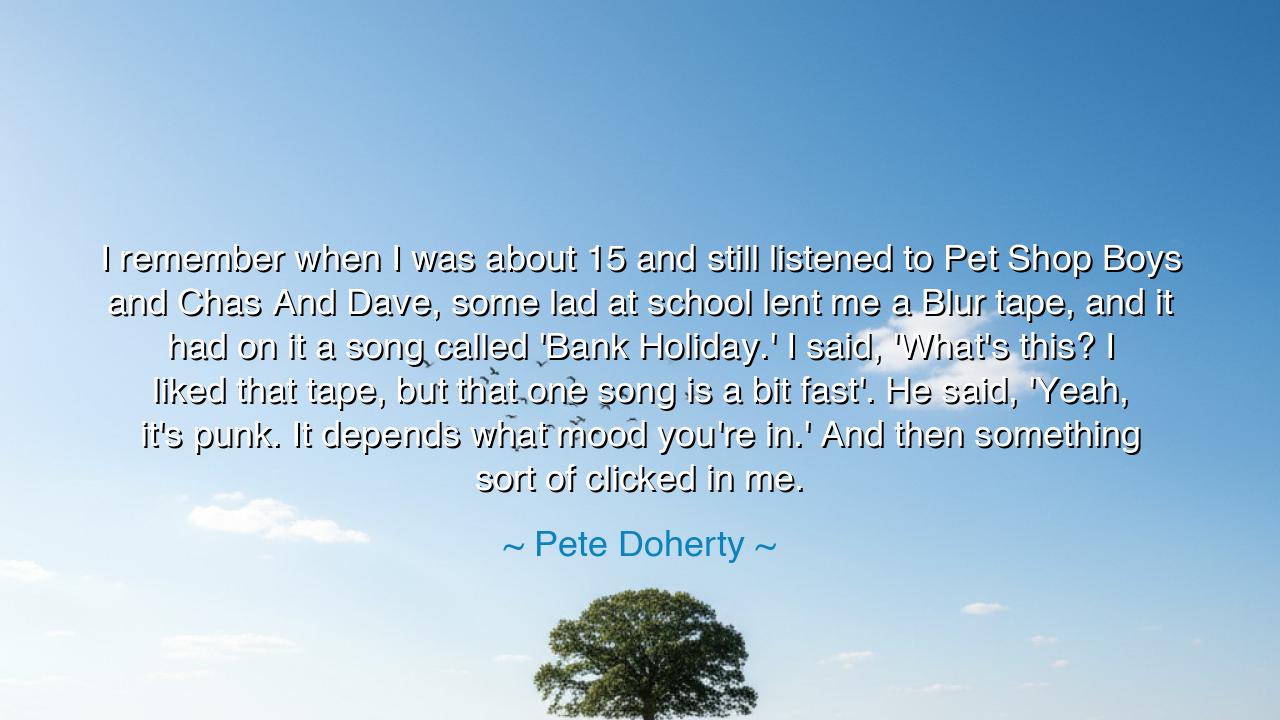
I remember when I was about 15 and still listened to Pet Shop
I remember when I was about 15 and still listened to Pet Shop Boys and Chas And Dave, some lad at school lent me a Blur tape, and it had on it a song called 'Bank Holiday.' I said, 'What's this? I liked that tape, but that one song is a bit fast'. He said, 'Yeah, it's punk. It depends what mood you're in.' And then something sort of clicked in me.






The wandering poet of modern song, Pete Doherty, once recalled with candor the moment of his awakening: “I remember when I was about 15 and still listened to Pet Shop Boys and Chas And Dave, some lad at school lent me a Blur tape, and it had on it a song called 'Bank Holiday.' I said, 'What's this? I liked that tape, but that one song is a bit fast.' He said, 'Yeah, it's punk. It depends what mood you're in.' And then something sort of clicked in me.” Though wrapped in the casual words of memory, this recollection contains the seed of transformation. It speaks of the power of art to awaken new horizons within us, of how the right encounter at the right time can shift the entire course of a life.
When Doherty speaks of listening to Pet Shop Boys and Chas and Dave, he paints the picture of a youth still bound within the safe walls of familiar sounds. These were the rhythms of the known world, melodies he could dwell in without surprise. But then came the intrusion of the unfamiliar—the raw, restless chords of Blur, and within them, the lightning-bolt of a song called “Bank Holiday.” It was too fast, too wild, too different. At first, he recoiled, as every soul does when confronted by what shatters its habits. Yet this strangeness was the very spark of growth.
The friend’s words, “It depends what mood you’re in,” reveal the hidden key: that music, like life, is not one mood, one rhythm, one tone. It is a shifting spectrum, sometimes calm, sometimes violent, sometimes tender, sometimes furious. Doherty’s realization, his “click,” was the moment he understood that art speaks differently depending on the state of the soul. What once seemed unlistenable became revelation. In that moment, he ceased to be merely a listener of songs and became a seeker of expression.
History has often shown such turning points. Consider Beethoven, who, when first hearing Mozart’s operas, was struck by the fire of genius that lay beyond the measured works of his teachers. Or think of Bob Dylan, who transformed from folk purity to electric rebellion after hearing new currents in sound, shocking his followers but blazing new paths in music. In every age, the artist is awakened not by what is easy, but by what disturbs, what challenges, what is “too fast” until it is finally understood.
The origin of Doherty’s reflection lies in the timeless truth that art awakens in us when the soul is ready to receive it. At fifteen, with the world opening like a vast horizon, he was struck by the realization that music is not simply entertainment but a mirror of the inner life. Punk was not just noise—it was urgency, rebellion, raw energy. It taught him that one must sometimes leave the comfort of the familiar to discover the wildness of truth. This was not just the birth of a taste; it was the birth of an artist.
The lesson is clear: do not reject too quickly what feels strange, fast, or unsettling. Whether in art, in life, or in thought, the things that disturb us often carry the seeds of transformation. What is too wild today may be the voice we need tomorrow. Let your spirit be willing to listen in different moods, for every mood opens a new chamber of understanding. As Doherty discovered, one song, one phrase, one encounter can change the direction of a life.
Practical action follows. Seek out the unfamiliar in your own journey. Do not remain only with the sounds, sights, and thoughts that are safe. Let yourself be challenged by art that seems too raw, by voices that seem too strange, by perspectives that unsettle you. Return to them in different moods, and you may find that what once jarred your senses becomes a source of wisdom and renewal. In this way, you will grow, not only as a listener of art, but as a participant in the ever-expanding chorus of life.
Thus, Pete Doherty’s remembrance—“something sort of clicked in me”—becomes more than a personal anecdote. It is the eternal moment when the soul steps beyond the familiar and finds its new path. To future generations, let this be passed on: when confronted with the unfamiliar, do not flee, but listen again. For often it is in the song that feels too fast, too strange, that you will hear the call of your destiny.






AAdministratorAdministrator
Welcome, honored guests. Please leave a comment, we will respond soon